Daily Vocabulary Words: List of Daily Used Words in Leading International Newspapers
Hi there. Welcome to this special section @ Wordpandit.
Our endeavour here is very simple: to highlight important daily vocabulary words, which you would come across in leading newspapers in the country. We have included the following newspapers in our selection:
• The New York Times
• The Washington Post
• Scientific American
• BBC
• The Guardian
• Psychology Today
• Wall Street Journal
• The Economist
We are putting in extensive work for developing your vocabulary. All you have got to do is be regular with this section and check out this post on a daily basis. This is your repository of words that are commonly used and essentially, we are posting a list of daily used words. Hence, this has significant practical application as it teaches you words that are used commonly in leading publications mentioned above.
Visit the website daily to learn words from leading international newspapers.
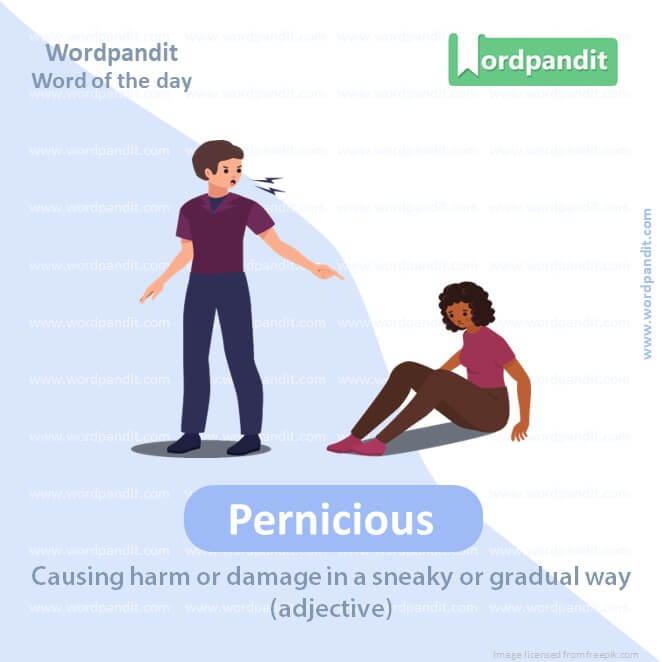
WORD-1: Pernicious
CONTEXT: The pernicious effects of misinformation on democratic processes around the world.
SOURCE: Al Jazeera
EXPLANATORY PARAGRAPH: Imagine there’s a toy that looks fun, but if you play with it, it can break or hurt you. “Pernicious” is a word we use to describe something that looks okay but can cause harm or trouble. It’s like a sneaky bad toy that doesn’t look bad at first.
MEANING: Causing harm or damage in a sneaky or gradual way (adjective).
PRONUNCIATION: Per-nish-us
SYNONYMS: Harmful, Damaging, Malevolent, Destructive, Toxic, Insidious, Noxious
USAGE EXAMPLES:
1. Smoking is a pernicious habit that damages the lungs.
2. The spread of incorrect information can have pernicious effects on society.
3. She was unaware of the pernicious influence of her friends.
4. The pesticide had a pernicious impact on the environment.
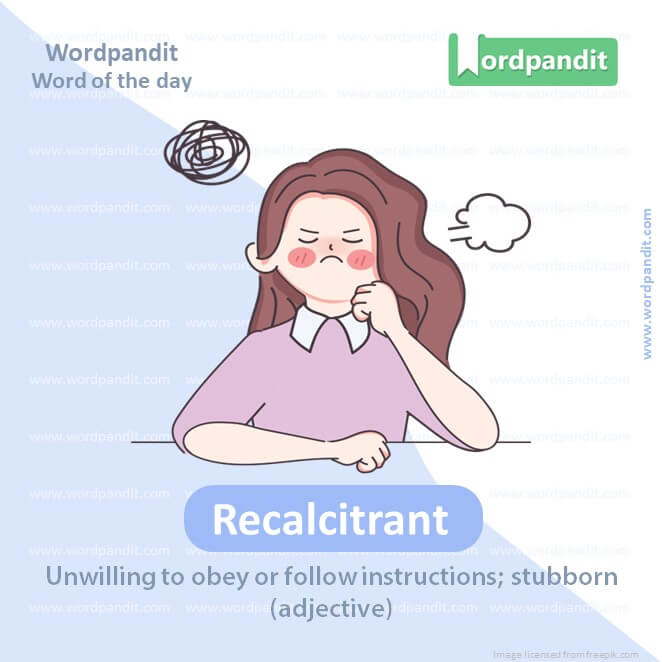
WORD-2: Recalcitrant
CONTEXT: The recalcitrant behavior of the lawmakers who refused to compromise on the new policy proposals.
SOURCE: Washington Post
EXPLANATORY PARAGRAPH: Imagine you ask your toy robot to move, but it just stands still and doesn’t listen to you. “Recalcitrant” is a word we use to describe someone or something that’s very stubborn and doesn’t want to obey or follow instructions.
MEANING: Unwilling to obey or follow instructions; stubborn (adjective).
PRONUNCIATION: Re-cal-si-trant
SYNONYMS: Stubborn, Uncooperative, Obstinate, Defiant, Contrary, Insubordinate, Resistant
USAGE EXAMPLES:
1. The recalcitrant child refused to do his homework.
2. The horse was recalcitrant and wouldn’t jump the fence.
3. The company faced recalcitrant challenges while introducing the new system.
4. He was recalcitrant to the new rules imposed by the school.
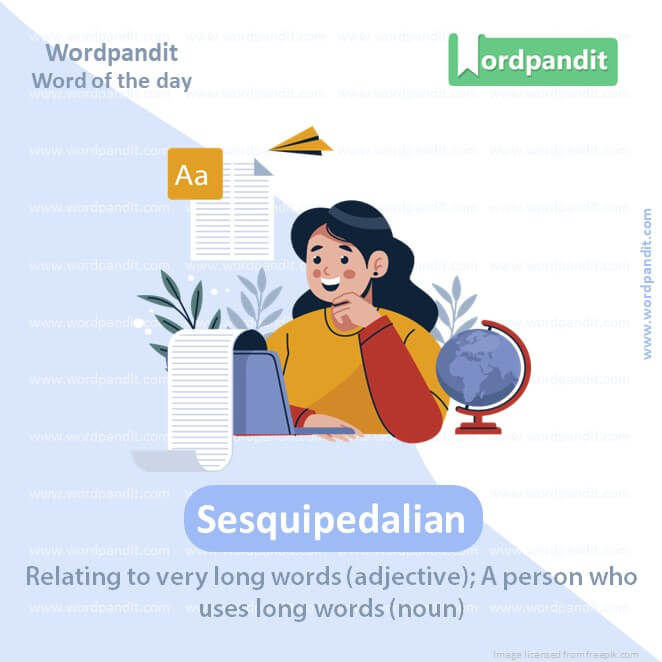
WORD-3: Sesquipedalian
CONTEXT: The author’s sesquipedalian writing style was noted for its complexity and rich vocabulary, though some readers found it pretentious.
SOURCE: New York Times
EXPLANATORY PARAGRAPH: Imagine a toy train that’s super, super long! “Sesquipedalian” is a fun word that we use to describe words that are really long or people who like to use long words.
MEANING: Relating to very long words (adjective); A person who uses long words (noun).
PRONUNCIATION: Ses-kwi-pe-day-lee-an
SYNONYMS: Wordy, Prolix, Verbose, Long-winded, Extended, Lengthy, Elongated
USAGE EXAMPLES:
1. The professor’s sesquipedalian lecture made it difficult for students to understand.
2. He was known for his sesquipedalian style of writing.
3. “Hippopotomonstrosesquippedaliophobia” is a sesquipedalian term that means “fear of long words.”
4. The debate team avoided using sesquipedalian words to connect better with the audience.
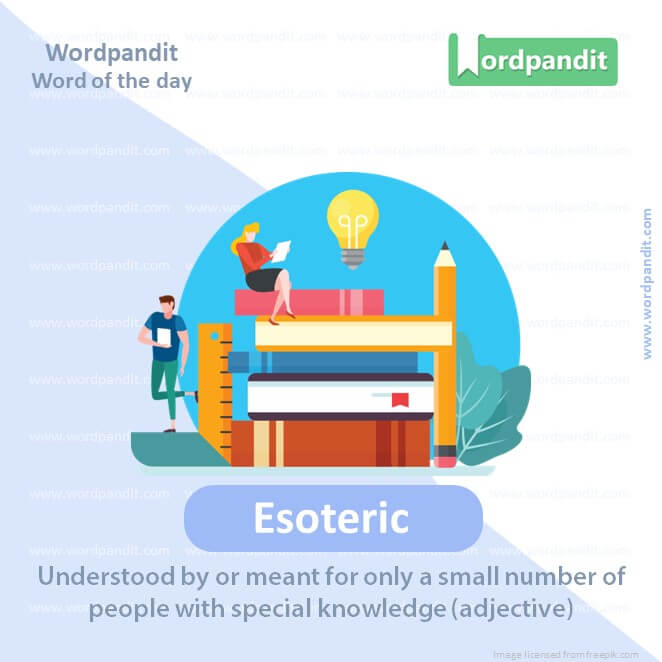
WORD-4: Esoteric
CONTEXT: The film review delved into the director’s use of esoteric symbolism, which might have been missed by a general audience.
SOURCE: New York Times
EXPLANATORY PARAGRAPH: Imagine a secret toy club where only a few kids know the special handshake to enter. “Esoteric” is a word we use to describe something that’s understood or known by only a few special people, kind of like that secret handshake.
MEANING: Understood by or meant for only a small number of people with special knowledge (adjective).
PRONUNCIATION: Ess-oh-ter-ic
SYNONYMS: Cryptic, Mysterious, Obscure, Arcane, Enigmatic, Abstruse, Recondite
USAGE EXAMPLES:
1. The scientist spoke about an esoteric theory that went over everyone’s heads.
2. Esoteric rituals are part of the group’s traditions.
3. The book is filled with esoteric references that are hard to understand.
4. The artist’s work is esoteric, understood by only a few.
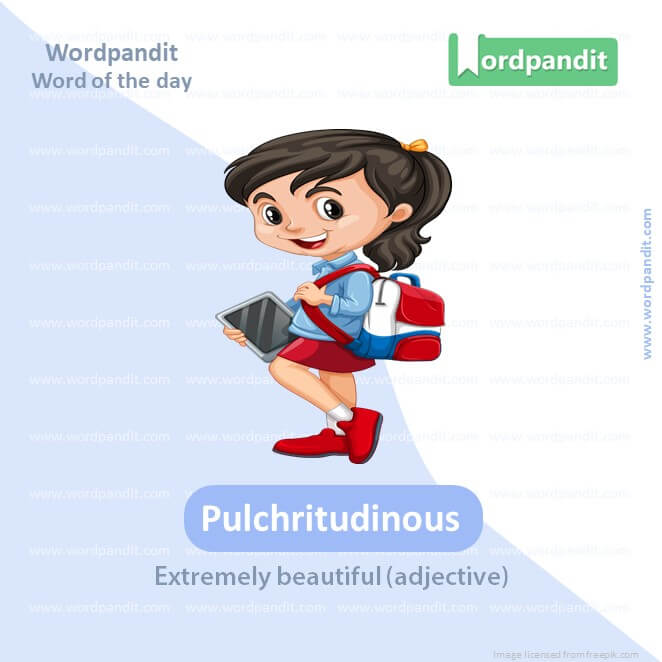
WORD-5: Pulchritudinous
CONTEXT: The travel piece described the pulchritudinous landscapes of the remote island, enticing readers with vivid imagery.
SOURCE: New York Times
EXPLANATORY PARAGRAPH: Imagine the most beautiful, sparkly, and amazing toy you’ve ever seen. “Pulchritudinous” is a fancy word we use to say something is very, very beautiful.
MEANING: Extremely beautiful (adjective).
PRONUNCIATION: Pul-kri-tood-in-us
SYNONYMS: Beautiful, Gorgeous, Attractive, Lovely, Stunning, Ravishing, Dazzling
USAGE EXAMPLES:
1. The sunset over the ocean was pulchritudinous.
2. The actress was known for her pulchritudinous features.
3. He was mesmerized by the pulchritudinous sight of the garden.
4. Paintings in the gallery were pulchritudinous and captured everyone’s attention.
WORD-6: Antediluvian
CONTEXT: The architecture critic wrote about the city’s preservation of its antediluvian buildings, emphasizing their historical significance.
SOURCE: Washington Post
EXPLANATORY PARAGRAPH: Imagine toys that were made a really, really long time ago, way before your grandparents were even born! “Antediluvian” is a word we use to talk about things that are super old, especially things from before a big flood a long time ago.
MEANING: Extremely old; from before the biblical flood (adjective).
PRONUNCIATION: An-te-di-loo-vee-an
SYNONYMS: Ancient, Prehistoric, Archaic, Old-fashioned, Outdated, Primitive, Antiquated
USAGE EXAMPLES:
1. The antediluvian artifacts were discovered in the archaeological dig.
2. His antediluvian beliefs were not in line with modern times.
3. The museum showcased antediluvian tools used by early humans.
4. He shared an antediluvian story passed down through generations.
WORD-7: Voracious
CONTEXT: The CEO’s voracious appetite for success helped transform the small startup into a multinational corporation.
SOURCE: Washington Post
EXPLANATORY PARAGRAPH: Imagine a toy monster that’s always hungry and wants to eat all the time. “Voracious” is a word we use to say that someone is super hungry or wants a lot of something.
MEANING: Having a very eager approach to eat a lot (adjective); Extremely hungry or wanting to consume a lot of something (adjective).
PRONUNCIATION: Vo-ray-shus
SYNONYMS: Ravenous, Insatiable, Greedy, Hungry, Avid, Eager, Wolfish
USAGE EXAMPLES:
1. He is a voracious reader who finishes multiple books a week.
2. The lion had a voracious appetite after hunting.
3. She had a voracious desire to learn new languages.
4. The voracious flames consumed the entire forest.
WORD-8: Mellifluous
CONTEXT: The opera singer’s mellifluous voice captivated the audience, earning her a standing ovation.
SOURCE: Washington Post
EXPLANATORY PARAGRAPH: Imagine a toy music box that plays a really sweet and smooth tune. “Mellifluous” is a word we use to say that a sound or voice is very pleasant and smooth to listen to, like that lovely tune.
MEANING: Having a smooth, flowing sound that is pleasant to hear (adjective).
PRONUNCIATION: Mel-li-floo-us
SYNONYMS: Sweet-sounding, Harmonious, Melodic, Tuneful, Lyric, Dulcet, Euphonic
USAGE EXAMPLES:
1. The singer had a mellifluous voice that captivated the audience.
2. The mellifluous sound of the river was relaxing.
3. Birds in the morning often produce a mellifluous song.
4. The poem was read in a mellifluous tone that soothed the listeners.
WORD-9: Lumping
CONTEXT: Lumping them together as victims, because they are US clients, is terribly hypocritical.
SOURCE: Al Jazeera
EXPLANATORY PARAGRAPH: Imagine you have a big box of different toys and you put them all together in one big pile. “Lumping” means putting different things together as if they were all the same.
MEANING: To group different things together without considering their differences (verb).
PRONUNCIATION: Lump-ing
SYNONYMS: Grouping, Clustering, Combining, Aggregating, Amassing, Merging, Assembling
USAGE EXAMPLES:
1. You can’t keep lumping all the problems together; each one needs a solution.
2. She’s lumping all the students in one category, which isn’t fair.
3. I don’t appreciate being lumped with the others when I worked hard on my project.
4. He had a habit of lumping similar items in the same drawer.
WORD-10: Unequivocal
CONTEXT: America’s unequivocal backing for the Netanyahu government.
SOURCE: Al Jazeera
EXPLANATORY PARAGRAPH: Imagine a toy robot that always says “YES” when it means yes and “NO” when it means no, without any doubt. “Unequivocal” is a word we use when we want to say that something is very clear and sure, without any doubt.
MEANING: Leaving no doubt; very clear and certain (adjective).
PRONUNCIATION: Un-e-kwiv-o-cal
SYNONYMS: Clear-cut, Definite, Unambiguous, Undoubted, Absolute, Positive, Indisputable
USAGE EXAMPLES:
1. Her support for the project was unequivocal.
2. He gave an unequivocal answer, leaving no room for confusion.
3. The evidence was unequivocal, proving the suspect’s guilt.
4. The team’s success was an unequivocal demonstration of their skills.
vocabulary journey
In the realm of language learning, one unparalleled method has been consistently proven to provide tremendous value – engaging with vocabulary journal words. This practice is a brilliant tool that provides a platform for the gradual introduction of new words, phrases, and their nuances.
But how exactly should we approach learning vocabulary journal words?
Originally, vocabulary journal words are a collection of new words you encounter that are challenging and unfamiliar. On stumbling upon such words, take the first step by writing them down in your journal. But simply recording them isn’t enough. The real strength of vocabulary journal words lies in understanding and using them in context. Draft sentences using these words, as this practical usage not only enhances retention but also familiarizes you with their applicability.
Expanding your vision beyond memorization, indulge in understanding the background of these vocabulary journal words. Dive into the etymology of the words, learn their origins, and uncover the different meanings they’ve held over time. This nugget of information often aids in deeper understanding and long-term retention of words.
Your engagement with vocabulary journal words should not be reserved for solitary learning. Discuss these words in conversation with friends, family, or language mentors. This encourages active usage and, silently but surely, integrates them into your everyday language.
Another enchanting side to vocabulary journal words is the potential for creativity. Create small stories or visuals connected to the words, leading your brain to create multiple neural connections to the meaning of the word – a powerful strategy for enhancing retention.
In essence, vocabulary journal words offer a multifaceted, immersive learning process that goes beyond just enhancing your word-list. They open doors to the dynamic world of language and its contexts, training your mind to appreciate, understand, and effectively communicate with an enriched vocabulary. Consider vocabulary journal words not as a task but as your secret allies on your beautiful journey through language learning.











